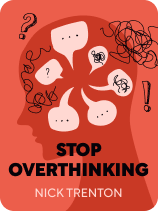

This article is an excerpt from the Shortform book guide to "Stop Overthinking" by Nick Trenton. Shortform has the world's best summaries and analyses of books you should be reading.
Like this article? Sign up for a free trial here.
What does overthinking mean? Where does overthinking come from?
Nick Trenton’s book Stop Overthinking discusses the harm overthinking does to our bodies and minds. A little bit of stress can be healthy, but when you’re constantly thinking about an event and worrying over it, you need to take a step back and reevaluate.
Keep reading to learn more about overthinking and its origins.
What Is Overthinking?
What does overthinking mean? According to Trenton, overthinking is what happens when you think about something so much that it becomes harmful to your health. For example, you just decided between two apartments and signed a lease. Right after, you start wondering whether you made the right choice and spend so much time thinking about it that you feel stressed and anxious all week.
(Shortform note: One common and harmful form of overthinking is indecision. Psychologists refer to overthinking decisions as analysis paralysis—when you spend so much time weighing your options that you put off decision-making longer than necessary. When you overthink every decision, you can feel overwhelmed and experience more anxiety. To combat analysis paralysis, some psychologists suggest you practice making small decisions quickly.)
You might think that your thoughts are helpful—that you’re working to solve the issue—but Trenton says that’s rarely the case. When you think about the same thing over and over again, your thoughts cease to add value or provide any solutions to the problem—they only create stress. In fact, whatever problem you’re grappling with usually isn’t the true cause of the anxiety you’re feeling. Rather, it’s your overthinking habit that creates anxiety.
For example, in a job interview, you might have responded to a question in a way you didn’t intend to and then spent hours worrying about that moment. In this case, your worry doesn’t change how you responded to the question. What’s more, your response to the interview question may not have even been problematic: It’s just your swirling thoughts and worries about the response that create a problem and give you anxiety.
(Shortform note: In Emotional Intelligence, Daniel Goleman elaborates on why your anxious thoughts only cause more anxiety. He explains that when you worry, you’re trying to find solutions to problems before they even occur. As a result, overthinking becomes a problem itself as these worries tend to spiral out of proportion and don’t help you solve the problem that you’re worrying about in the first place. This is because, unlike when you’re creatively brainstorming solutions, you’re in a negative state of mind while worrying, which limits your ability to approach the problem from new angles or generate any useful solutions.)
Causes of Overthinking
Why do some people overthink more than others? Trenton explains that anxiety and overthinking are intertwined. When you’re prone to anxiety, you’re more likely to overthink. Two main factors affect your level of anxiety: your genetics and your environment.
Although there isn’t one specific gene that causes anxiety, researchers have found that multiple genes can predispose you to it. People with these genes tend to have more overactive brains—when they’re not doing anything that requires mental focus, their thoughts are more prone to anxious wandering.
Environmentally, triggers in both your immediate surroundings and the broader world can increase your anxiety and overthinking tendencies. These might be things like smells or crowds. On a deeper level, researchers have also linked anxiety to past traumatic events, such as experiencing neglect during childhood.
| How Anxiety Perpetuates: Family Cycles and Anxiety as a Habit Trenton contends that a mixture of genetics and environment influence your likelihood to develop anxiety, with some psychologists believing that anxiety is about 30% genetic. Anxiety can cycle through families because anxious parents unconsciously raise their children in anxious environments. For example, a parent who takes away their child’s bicycle after a minor fall or refuses to let them go to sleepovers may increase anxious tendencies in their children by modeling to them that the world is a scary place. However, according to some psychologists, becoming aware of these behaviors is the first step to disrupting the cycle of anxiety that can run in families. In Unwinding Anxiety, Dr. Judson Brewer provides more insights into why environments can cause anxiety. He explains that anxiety is a habit—an endless loop that causes behaviors that only make you more anxious, such as overthinking. Anxiety occurs when you feel fearful of something, yet you lack the information or ability to relieve that fear. This causes you to associate particular aspects of your environment with your anxious feelings, which only increases the scope of your anxiety. For example, you might start associating something in your environment (such as crowded places) with feelings of anxiety, which could lead you to grow anxious about going outside in general. |
Consequences of Overthinking
According to Trenton, the stress of overthinking can cause real harm to your mental, physical, and social health. Stress is your body’s reaction to an external pressure, such as an upcoming presentation at work. Anxiety is the feeling you experience when you encounter this stressful thing. While a healthy dose of stress is beneficial for growth, your body isn’t meant to handle long periods of stress. Also known as chronic stress, this prolonged strain on your mind and body wears down your ability to cope with and overcome challenges.
- Mental: Excessive worrying takes a toll on your self-confidence, your mood, and your ability to concentrate on other things.
- Physical: If you’re in a state of constant worry, you might experience headaches, exhaustion, or a rapid heart rate.
- Social: Overthinking can hinder your ability to form and maintain healthy relationships, disrupt productivity, or even fuel negative habits like self-isolation.
| Why Chronic Stress Takes a Toll In Why Zebras Don’t Get Ulcers, Robert Sapolsky explains the evolutionary reason why chronic stress is harmful. He argues that our bodies are programmed to respond intensely to immediate stressors such as predators. In the modern world, however, we encounter a different type of stress far more often—sustained stressors like financial or job concerns, which our bodies aren’t equipped to handle. Because our stress responses are so intense, prolonged stress can take a heavy toll on our physical and mental health—Sapolsky explains the science behind why. When your stress response is triggered, your sympathetic nervous system kicks in to prepare your body to react to the threat, releasing a host of neurotransmitters and diverting blood flow. When long-term stressors activate this fight-or-flight mode too often, it can disrupt many bodily systems such as your cardiovascular system, metabolism, immune system, and brain function. Sapolsky describes additional physical effects that chronic stress can have—it can stunt growth or make people age faster, as well as damage digestive and immune systems. In terms of mental health, depression and anxiety involve the body’s inability to deal properly with stress. Chronic stress can worsen anxiety, as people with these disorders have more hyperactive stress responses. Similarly, excessive stress can cause neurochemical changes in your brain that result in depression. Other experts further explain that chronic stress drains your mental energy, which affects how you interact with others. When stress depletes your mental resources, you might find yourself less communicative, more impatient, and prone to irritability. |

———End of Preview———
Like what you just read? Read the rest of the world's best book summary and analysis of Nick Trenton's "Stop Overthinking" at Shortform.
Here's what you'll find in our full Stop Overthinking summary:
- What overthinking is and how it’s connected to stress and anxiety
- Ways you can manage stress before, during, and after it happens
- How to conquer your habit of overthinking with long-term solutions






